People often assume that we’re able to travel full-time because we’re millionaires, but they couldn’t be more wrong. Nevertheless, I always say, yes, I am. I’m a “time millionaire.” I may not have lots of money, but I have time, and that’s most important. -Leander Nardin
Akela World is comprised of Leander, Maria, their son, Lennox, and of course Akela, a 1977 Mercedes Benz LA 911 B. There are many overlanders in various vehicles on epic journeys all over the world. However, the number representing those who live and work on the road permanently is much less, and even fewer homeschool their child remotely. There is also just a handful who drive this classic but legendary old Mercedes.
I discovered Akela World online and was initially transfixed by their beautiful photography and epic overlanding rig. But it was after reading their inspirational story and future plans that I was completely blown away. Thus, I was more than a little excited when I got the opportunity to sit on a call with Leander and discuss life on the road, their round-the-world overland journey, upcoming plans, and, of course, to learn all about their beautiful rig. Leander is as cool as you’d expect, extremely knowledgeable, kind, humble, funny, and a pleasure to interview. Akela World has some very exciting plans in the works, so be sure to check out their short film, website and socials.
What does your day-to-day look like at present?
At this very moment, we’re in Greece. I’m Leander; I travel with my girlfriend of 17 years, Maria, and our nine-year-old son, Lennox. We began our journey four and a half years ago in Austria, from there completing the Silk Road to Vladivostok, then to Korea, Japan, Borneo, Indonesia, Australia, then the USA (but we had to ship back to Europe due to Covid). Three months ago, we found a street puppy; it seems everyone rescues a dog in Greece. I have to say travelling full-time intercontinentally with a child and dog isn’t really possible for our plans. A lot of people remain on the same continent, so they perhaps don’t understand the challenges of travelling further afield with a dog. However, our rescue pup will be staying with my sister for the next part of our travels.
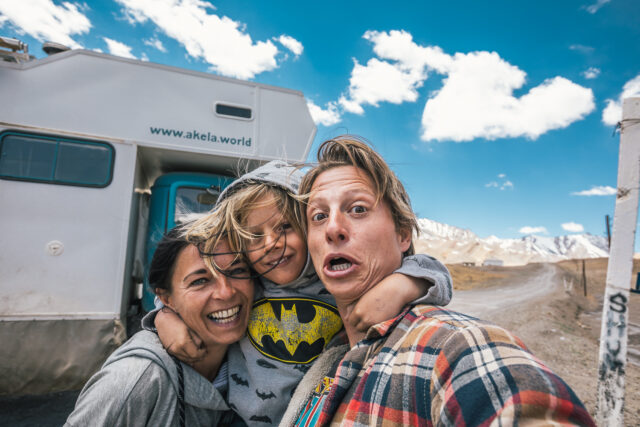
When did your love of overland travel begin?
Maria and I have been travelling for the past 17 years, but largely with backpacks. Around eight years ago, it all began; Lennox was one year old. We were flying to Thailand for two months backpacking, but with a kid, luggage, and photography equipment, it was challenging. It was during this trip that we decided we were sick of having constant deadlines and never having enough time in one place. We had always wanted to go to New Zealand, but the flight tickets and cost of renting a campervan for a couple of months were astronomical just for a holiday. Thus, I had this stupid idea that we should buy a bus and drive there. However, after some research, we realised a bus didn’t work for us weight wise—that led us to the Mercedes truck.
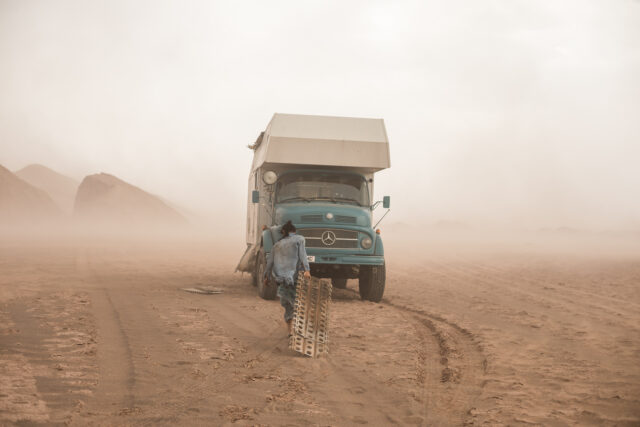
Why did you choose the Mercedes-Benz LA 911 B?
The truck is perfect in many ways; it gives you a lot of comfort, especially with a kid and working on the road. That said, there is no perfect vehicle. In some countries, Central Asia and America, for example, the size of the truck doesn’t matter. But driving through Japan, Indonesia, or even Greece, it’s a pain in the arse. Low-hanging branches, narrow roads—it’s not ideal and sometimes prevents access. It’s also slow, and people don’t get quite how slow it is. People often say, ‘Oh, well, our VW Bus is also slow.” And we’re like, “No, much slower than that.” On the Pamir Highway, it took 10 hours to do 100 kilometres every single day. This can be an issue, particularly if visa time is running out. Even so, in general, I love it and believe it’s the perfect vehicle for us.
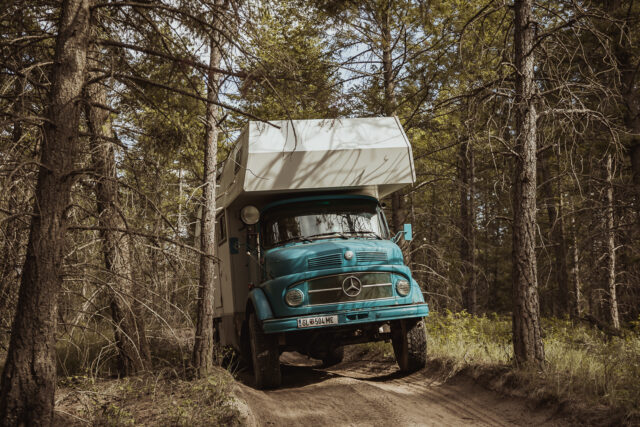
There are three main reasons we purchased this particular truck. Firstly, there are so few electrics, all mechanical, so we assumed in non-industrial countries there’d always be someone who could help with repairs. That didn’t turn out to be true, even in Central Asia— proper mechanics are dying out. The second reason was the availability of spare parts from Mercedes. We thought they would be accessible all over the world, which is also not really true. It’s still better than many other vehicles, but not great. Honestly, one of the main reasons we bought the truck is its face. Take one look, and it makes you smile! We’d never drive a comparable MAN KAT truck; it’s too military-looking, and we want to visit a country, not conquer it! The first impression with the truck is a smile. It’s a positive vibe.
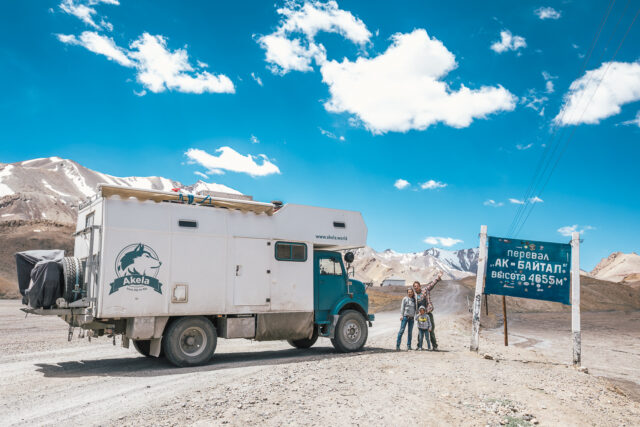
Where does the name for the truck, Akela, come from?
In Disney’s Jungle Book, Akela is the leading wolf in the pack. It was always Lennox’s favourite book when he was little. We’ve always wanted to turn our son into a Mowgli, and we’ve always been inspired by the story. Akela (the truck) is the leading wolf in our pack.

How long did the truck build take? What was the experience like?
It was hell! I’m a photographer, a creative—I had no idea about mechanicals or electrics. We found the truck in very original condition. At the time, I didn’t even have a truck driving license. It was about 20,000 € and included a motorbike. It had a basic camper setup built by an older gentleman. However, it was old and needed a complete refit. I figured we could at least utilise the existing solar panels, water tanks, and fridge. We had a budget for the build of around 30,000 €. Well, it turned out I was completely wrong. All the things we bought were crap, except for the truck itself.
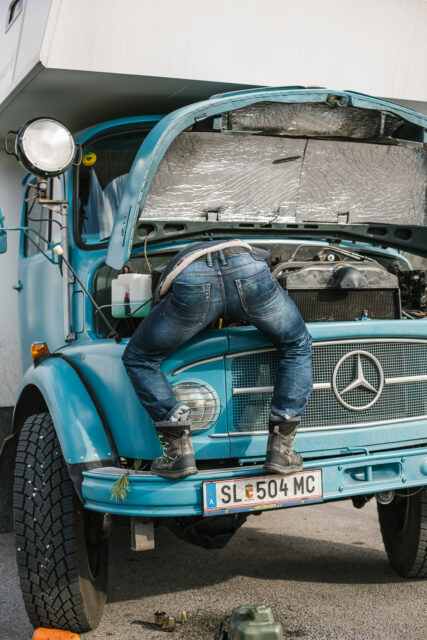
We began by completely dismantling the Mercedes because it was really rusty. Then it was a big decision: do we go all-in or sell and move on? At the start of the build, I was naive. I didn’t have a clue about the work involved, and honestly, that was lucky because If I had, I don’t think I’d have started! Seven years ago, there weren’t the resources there are now. In the end, we just went for it and kept going. I worked on it full-time, and I mean seven days a week with the truck for two years. Working all day on it, then spending all night researching how to do the jobs for the next day. It was a huge learning curve, just brutal; it nearly ended my and Maria’s relationship. We made it, but it cost triple what we expected. If I built it again, it would be way cheaper, but that’s all part of learning.
What has your world overlanding route look like?
Our entire route can be viewed here: akela.world
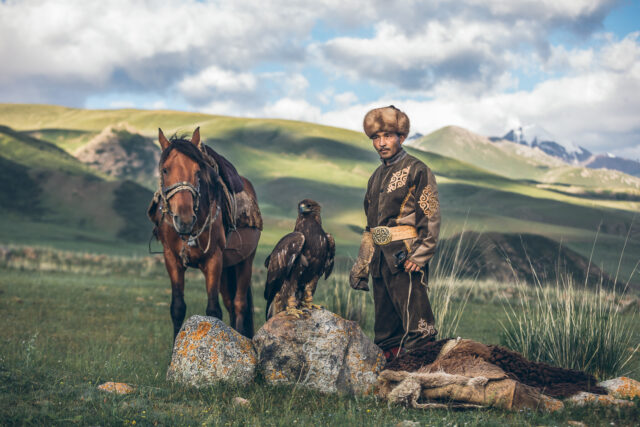
Was there a particular road/route that stands out as the most challenging?
In places like Tajikistan, Uzbekistan, and Mongolia, the roads aren’t great, and it was demanding at times. However, by now, almost 60 percent of the truck is new, and I could produce a guide on fixing this vehicle. Consequently, this meant the Mercedes was at least reliable for the most part. Central Asia was difficult at times, but the biggest issue we ever had was entering Australia due to bureaucracy and quarantine. If you choose to drive a challenging road, then that’s up to you, and you’re independent. But when it comes to entering a country, you rely on authorities, and that can make it hard. Being self-responsible is one thing, but the biggest challenges have been dealing with the bureaucracy of entering countries—especially Australia. Let me explain.
We had been in Indonesia for a year, but we spent an entire month cleaning the truck in Bali with a toothbrush. Lennox was in an international school as the cleaning process was so involved that we had no time for him at all. Dometic is one of our sponsors, and they warned us we couldn’t enter Australia with asbestos parts. I didn’t realise that the truck had asbestos parts, like gaskets and brake pads (which are actually more reliable than new alternatives). We had to fly a friend from Austria to Indonesia with spare parts to replace all the asbestos components. At the same time, we met a really nice Australian guy through Facebook, an asbestos surveyor. We paid for his flights from Perth, he investigated the entire truck for free and sent anything questionable to the lab. It was a real challenge. It all turned out, but you never know what the border will bring, and who happens to be working on that shift. If you have a difficult person on the border, you’re screwed either way, but we had a nice guy. He was more interested in our story and the truck. He was like, “Yep, your truck is very clean. Now, tell me about your trip!” It took just 10 minutes, and we were in.
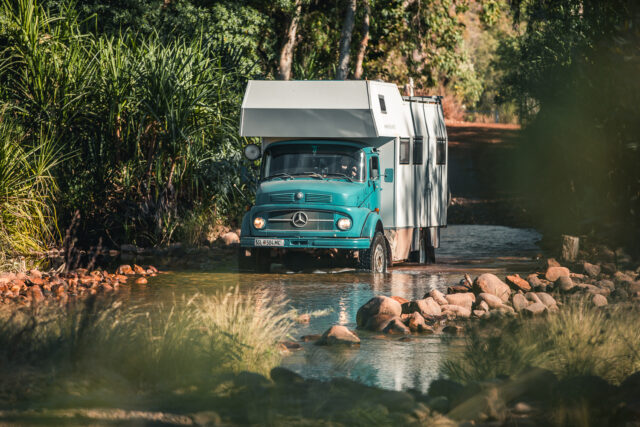
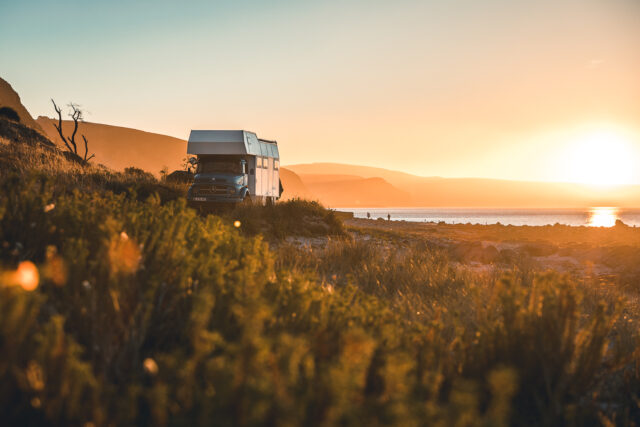
What modifications did you make to the truck for life on the road as a family? Do you have any top tips for others considering traveling with a child?
We didn’t make many child-specific modifications. We do have the “alcove,” which is a separate sleeping area for us parents. We’re at the front top of the truck, and Lennox is at the very back. We wanted him to have his own space, but besides that, there aren’t many modifications specifically for him.
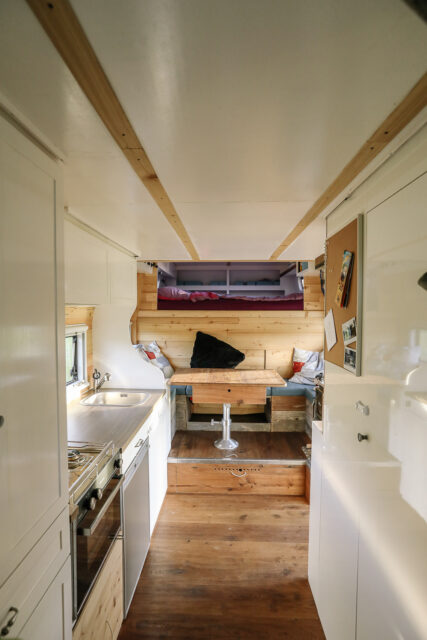
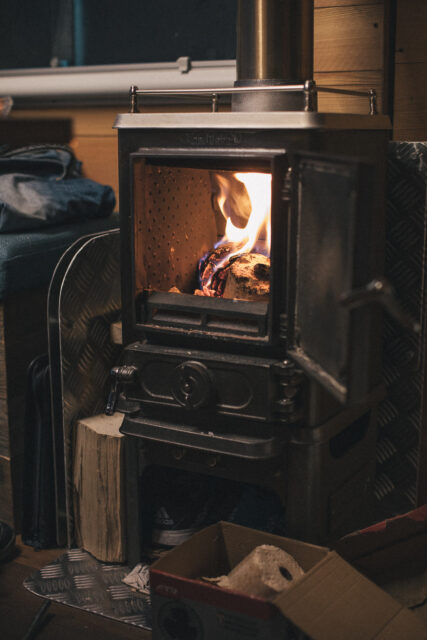
It depends a lot on the age of the kid, but let’s talk about Lennox, i.e., school age. A lot comes down to the parent’s mindset, personal objectives, and how long you plan to be on the road. The longer you travel, the more your mindset might shift. Your whole perspective of life and the system we’re living in changes. In the beginning, we were in a hurry because we needed to be back for Lennox’s school, but we soon decided against this. Now, we homeschool and don’t teach him from any set curriculum. Instead, teaching him things we think are essential for living on this planet, and it takes a s*** load of time. It’s not about simply driving from country to country and sightseeing; for us, it’s about interacting with the environment as a family.
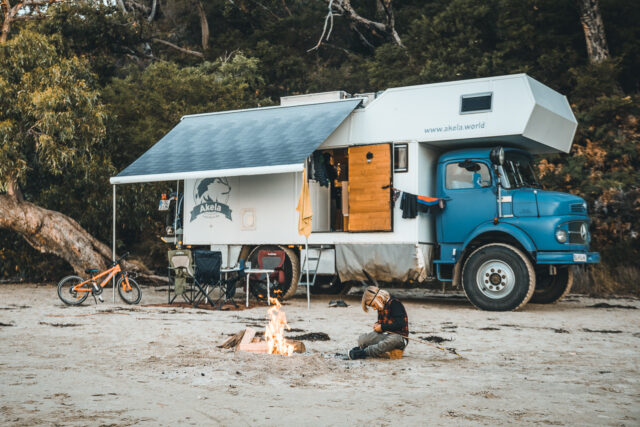
A tip for parents is that they need the curiosity for learning themselves. Let’s take history in school; sure, you learn parts, isolated facts, but you never really understand it in a global context. However, on the road, you see how the world’s history fits together—it unfolds in front of you. This form of learning is exciting as a parent and, subsequently, a great way to educate your child. I probably couldn’t homeschool another kid because so much is built on Lennox’s personal experiences. I can be talking about the rainforest and say to Lennox, “Do you remember the orangutans in Borneo?” He gets that, but you can’t do that with the average child. One of the big things that keeps us on the road is Lennox, feeding his curiosity. If more people travelled with kids, they’d see the real world, rather than viewing it from the isolated and often misleading, bubble most of us are accustomed to. That’s the way we create a new, more open-minded, and non-system-focused-educated generation.
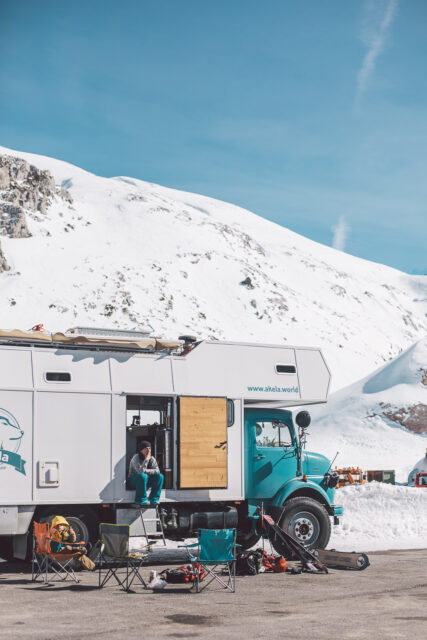
What are some of the biggest modifications you’ve made to the truck? What are your favourites?
I love our Goodyear tires; they were very expensive, but we’ve not had a single flat driving around the world, and they’ve probably still got 40 percent more life in them. That was a big investment but so worthwhile. Everything in our truck is backed up: we have a diesel heater, but we also have a wood burner. Technology often breaks, but old-school stuff generally doesn’t. Sure, it’s more work, but it’s dependable. Modifications like this ensure we’re always covered if things go wrong. The truck runs on 24 volts, but the living space runs on 12 volts, so we have a second alternator in the engine bay, which charges the batteries as we’re driving. Additionally, we have solar that charges both front and rear batteries. Power is probably our biggest priority, so we make sure all bases are covered.
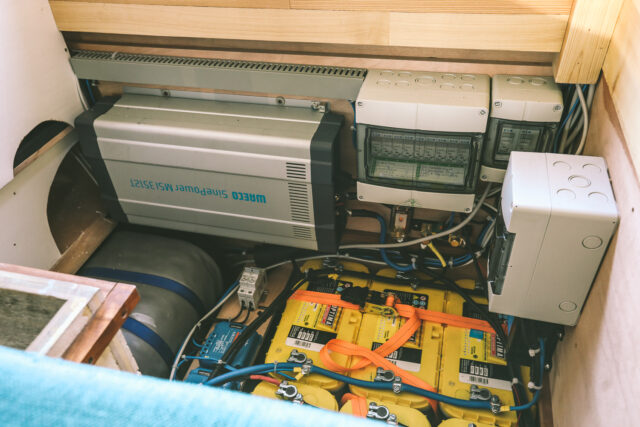
Honestly, we don’t have that many huge mechanical modifications. You need to keep it as simple as possible. We did consider a turbo that would boost power to 170 horsepower instead of its current 130 horsepower. I’d love a turbo up hills, man, I’d really love it, but we decided against it because it’s another thing that might break.
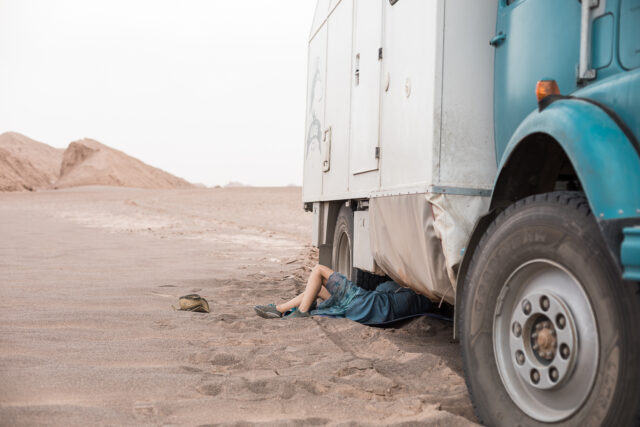
Do you have any words of wisdom for someone considering traveling in a classic vehicle?
Take spare parts—definitely. I’m not a Mercedes nerd, but I know how to fix things after living on the road. It became a hobby to find spare parts in every single country. If you choose a classic car, accept you won’t be the fastest. It becomes a mindset. If you accept this, it’ll adjust your approach to travel. You take things more slowly, and I believe that’s beneficial. Plus, an older vehicle is more environmentally friendly, contrary to belief, than a new car.
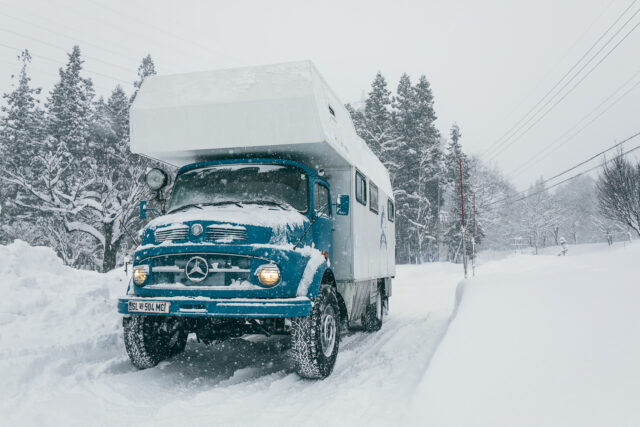
At the start of the trip, we heard a lot of people saying we’re polluting the environment with such an old truck. It’s frustrating as we’re extremely environmentally conscious and passionate about conservation. Sure, they’re right in some respects; it’s 22-23 litres for every hundred kilometres, which is a lot, but still better than comparable trucks and way less than a 10-tonne truck. Further still, it’s a 45-year-old vehicle, and whilst it does use a considerable amount of fuel, it’s important to recognise that our diesel consumption reflects our family’s entire energy requirements. We don’t need electricity, etc. Hence our footprint is way lower than the average household. I’m aware that’s still not perfect, but it’s a completely recycled old truck that’s been used now for over four decades, which makes it very environmentally friendly.

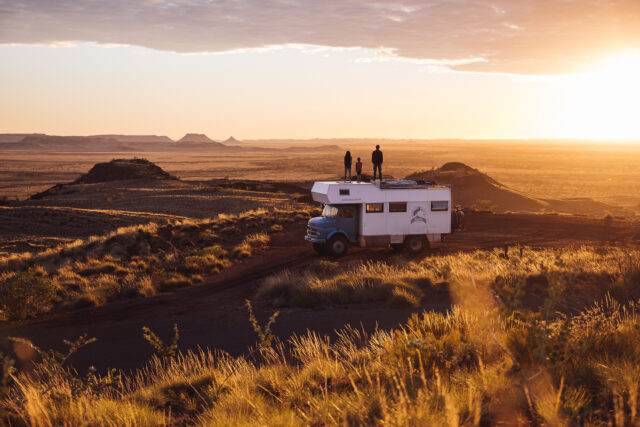
Where can people follow your adventures?
Website: akela.world
Instagram and Facebook: Akela World
Akela World in the Overland Journal: Spring 2021
Mercedes Benz LA 911 B
Specifications
Mercedes-Benz LA 911 B Bj1977
Power
OM352 130hp
Suspension and Drive
Original setup
Pneumatic transfer case
Rear diff lock
4WD
Wheels and Tires
Steel wheels
Goodyear Ultra Max 315 80 R22.5
Recovery and Armor
Aluminum sand ladders
Shovel
Strong arms and lots of endurance
Accessories
Hobbit wood stove
Eberspächer Airtronic D4 heater
Dometic Coolmatic CRX 110
Dometic awning perfect roof
Dometic SunLight cooking stove
Crank Again jumpstart setup
2 x 250-watt solar panels
Fuel Capacity
200 litre + 300 litre fuel tank
Water Capacity
300-litre water tank
Water jack fresh 4h water filter
Resources
Dometic.com
Goodyear.eu
Eberspacher.com
famous-water-shop.com
Our No Compromise Clause: We carefully screen all contributors to make sure they are independent and impartial. We never have and never will accept advertorial, and we do not allow advertising to influence our product or destination reviews.


